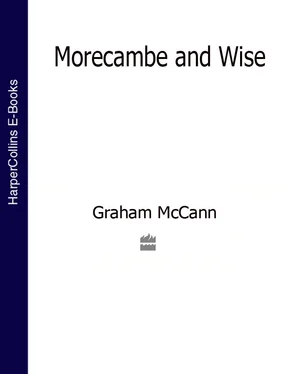‘It’s up to me’, Sadie said to her son, ‘to see that you are never tied to a whistle like your dad.’ 34Her problem now was to find an alternative means to achieve that dream.
The solution, when she thought about it, seemed obvious if also fraught with serious risks and the threat of future hazards. If Eric was too distracted to succeed at school, she reasoned, then she would have to make the source of his distraction into his principal vocation. He was not only a natural performer, she felt, but he also had, like many of his contemporaries, a growing fascination for the world of entertainment. Entertaining people, thrilling them, making them laugh and applaud, seemed a marvellous job, whether it involved racing up and down the wings of a football pitch or standing on the stage of a music-hall. Eric, while unsure of how suited he really was to such a world, would certainly have known that, for a working-class youth, it represented a possible escape from a future of endless toil in humble circumstances.
He would, he said, ‘have liked to have been a professional footballer. Purely and simply because it meant £ 5 a week. That was a lot of money. My father was getting 30 bob. Five pounds a week for playing a game of football I thought was easy. But I was never ever big or strong enough.’ 35Such physical limitations would not, however, preclude a career on the stage, or, indeed, the screen, as other youthful British-born performers from working-class backgrounds – such as Charlie Chaplin (from South London) and Stan Laurel (from Ulverston, just the other side of Morecambe Bay) – had already demonstrated. This was also, of course, a period when the precocious child star – such as Shirley Temple, Mickey Rooney, Judy Garland and the London-born boy with the very familiar surname, Freddie Bartholomew – was firmly in fashion. This was, as Joan Morecambe put it, ‘all dream stuff’, 36and Sadie allowed herself, just a little, to dream.
Eric had become an avid movie-goer, showing particular enthusiasm for – besides the ubiquitous Westerns – comedians such as Will Hay, Laurel and Hardy (it was the era of Our Relations, Way Out West and Block-Heads ), Harold Lloyd and Buster Keaton (both of whom were long past their best but whose classic shows were still in circulation) and – hugely popular at the time – Abbott and Costello (in such box-office successes as Who Done It? and Pardon My Sarong ). His admiration for Variety performers such as Arthur Askey grew through listening to him regularly on the wireless (the BBC started broadcasting Band Waggon in 1938); and he could hardly have failed to have been impressed by the extraordinary national celebrity of George Formby Junior.
Formby – guided by his formidable wife, Beryl – had gone from the difficult early days of playing the Northern music-halls in the shadow of his then famous father to first stage and then screen stardom. He held the enviable position of top British box-office attraction from 1937 to 1943 with the help of such movies as I See Ice and Trouble Brewing and such popular songs as ‘When I’m Cleaning Windows’ and ‘Chinese Laundry Blues’. Eric was by no means an unequivocal fan, even in those days, of everything Formby was famous for – the songs, he thought, were wonderful, but ‘as a comic he was about as funny as a cry for help’ 37– but he did, none the less, come to think of him as something of a personal hero. It is not difficult to imagine why.
Formby, with his flattened vowels and thickened twang, the general air of under-nourishment about him and that spectacularly unfortunate face that seemed forever pressed tight against the outside of a fìsh-and-chip shop window, must have appeared triumphantly, perhaps even deliriously, ‘ordinary’. A popular anecdote from that time – probably apocryphal but quite believable none the less – had a young boy point to a poster outside a theatre and ask his father, ‘Dad, is that George Formby?’ His father is said to have nodded and replied, ‘Yes, and if you keep playing with yourself you’ll end up looking like that!’ 38Although he was not, in reality, from the conventional working-class background that his image suggested, he was, like Eric, a Lancastrian, and, with his humorous songs that poked unpretentious fun at the back-street lives, humdrum experiences and minor embarrassments of his public, he was a professional performer who never seemed to let down those who identified with him. At a time when more than two million people found themselves face to face with what George Orwell called ‘the frightful doom of a decent working man suddenly thrown on the streets after a lifetime of steady work’, 39and thousands more than that were contemplating a probable future of bleak immobility and deadly deprivation, George Formby, however implausibly, seemed an inspirational figure.
Sadie was convinced that Eric, if only he applied himself to the task, had the ability to become, like Formby, a professional performer. She made every effort to encourage him to explore his latent talents. It would not, she appreciated, be easy: she had a name for him – ‘Jifflearse’ 40– that had been inspired by the strange, nervy restlessness that characterised so much of his behaviour, and it would be heard often, and at high decibels, during the months that followed. She did succeed in persuading him to learn how to play the piano, the clarinet, the guitar, the trumpet, the euphonium, the accordion and the mandolin. ‘But’, she would complain, ‘when he’d got it, he dropped it.’ 41At the same time, she also decided – on what seems to have been not much more than a whim – that he should go to dance lessons. One day, when Eric was ten years old, his cousin Peggy – a near-neighbour – called at the house: ‘Aunt Sadie,’ she is reputed to have said, ‘I’m going to dancing class on Saturday.’ ‘Where’s that?’ Sadie replied. ‘Miss Hunter’s, above the Plaza,’ Peggy said. ‘A shilling a lesson.’ ‘Do me a favour,’ asked Sadie, sensing a chance for a brief break from the antics of her increasingly boisterous son, ‘take Eric with you.’ 42
Eric, it appears, was rather impressed when he discovered that his first dancing partner was to be a girl – slightly older than him – named Molly Bunting. Miss Hunter, it appears, was rather impressed as well when she discovered that her new pupil could dance. Eric remembered:
Miss Hunter, after I’d been there about six weeks, came and saw my mother and said, ‘I think this boy’s got something, Mrs Bartholomew, he’s got a rhythm, you know!’ and me mother said, ‘Oh!’ So Miss Hunter said, ‘Yes, I think he ought to have private lessons’ – private lessons with her in her front room in Rosebury Avenue, at half a crown a time! So me mother said, ‘Oh, yes, all right then, give him private lessons if you think he’s got talent.’ 43
Sadie, in order to pay for those lessons, had to take on work – in addition to her existing job as an usherette at the Central Pier Theatre – as a daily help, cleaning at three or four houses every week, but she did so, more or less, without complaint, because she now felt a sense of vindication: Eric was, at long last, succeeding at something.
She found a plank of wood for him to tap-dance on at home, and made him a cut-down Fred Astaire-style outfit of top hat, white tie and tails for his lessons. She worked with him over time on a series of mini-routines that included borrowings from the likes of Flanagan and Allen and the latest Hollywood musicals. 44She also had a calling-card made – ‘Master Eric Bartholomew. Vocal Comedy & Dancing’ – and started to find him opportunities to perform in front of an audience: low-key social events known locally as ‘pies and peas’ (because young amateur performers entertained elderly people – usually in a church hall – and, in return, were given a hot meal of meat pies and mushy peas). On at least a couple of occasions Eric also appeared at benefits at the Central Pier, where he would black-up and imitate G. H. Elliott, ‘The Chocolate-Coloured Coon’ – a very popular musical act of the time – singing ‘Lily of Leguna’. 45Offers of further work started to arrive. When George and Sadie took Eric to the Silver Jubilee Club – a working men’s club – in nearby Torrisholme, the concert secretary asked George if Eric would perform for them at dinner time on the following Saturday. Eric recalled: ‘My dad said, “Oh, yes, he’ll do it.” So the feller said, “How much will he want?” My dad said, “He’ll do it for nothing.” He didn’t want anything for it! And me mother hit him.’ 46After Sadie’s swift intervention a fee of five shillings was agreed – the first sum of money Eric had ever earned for a performance. He arrived on time, put on his pumps (‘they wouldn’t let me put my taps on’), clambered up on to the billiard table that had been commandeered as a make-shift stage, and, there and then, did his act (‘There were balls flying everywhere!’). 47So popular was the performance that Eric found himself booked again for the following week.
Читать дальше











![Brian Thompson - A Monkey Among Crocodiles - The Life, Loves and Lawsuits of Mrs Georgina Weldon – a disastrous Victorian [Text only]](/books/704922/brian-thompson-a-monkey-among-crocodiles-the-life-thumb.webp)
